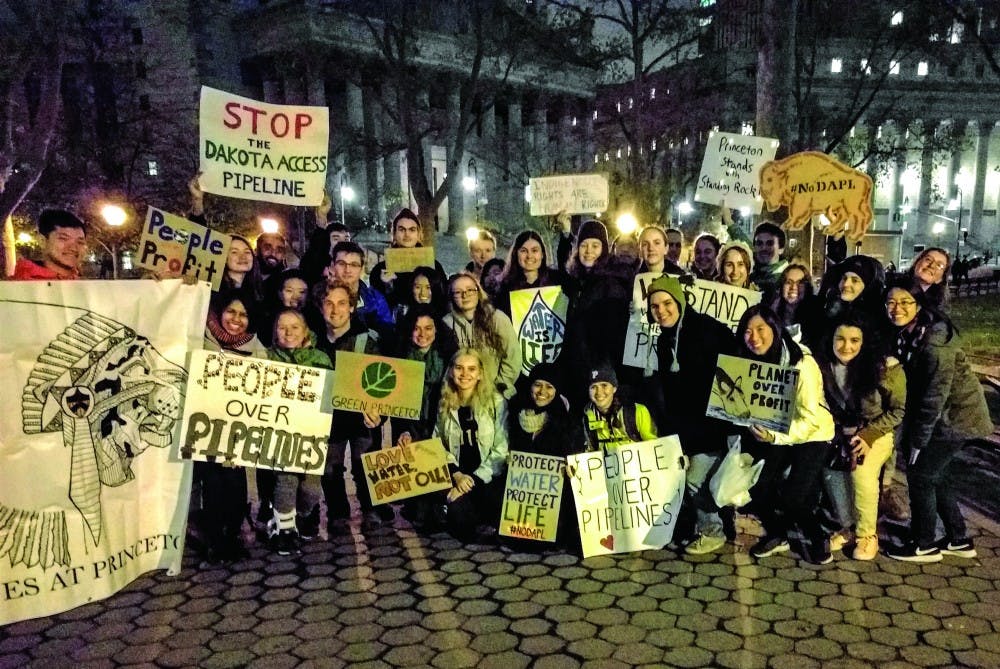Fifty-eight University students gathered in New York City on Tuesday, Nov. 15, to participate in a rally against the Dakota Access Pipeline. The purpose of the rally was to express solidarity with members of the Standing Rock Sioux Tribe, whose only water source is threatened by the pipeline.
“We cannot afford to be complacent in the country’s politics when the livelihood of so many people is at stake, nor condone the devastating impact on the climate caused by our continued reliance on fossil fuels,” Emily Chen ’17 and Yiwei Luo '17, two of the main organizers of the Princeton protesters, wrote on the Facebook event.
The rally, which took place in front of the offices of the U.S. Army Corps of Engineers in New York City, was part of a series of events planned around the country as part of a “Day of Action” in opposition to the pipeline. The rally was co-sponsored by Natives at Princeton, Green Princeton, The Princeton Progressives, Princeton Committee on Palestine, and Princeton Social Sustainability.
Green Princeton members reached out to people in-person, discovering it was the most effective way to gather participants, according to another organizer Dan Sturm ’19. He added that ten out of the almost sixty participants came from the same co-opt.
Funding for the event was obtained from an alumni group called the Princeton Progressives, enabling students to travel via charter bus and train without paying out-of-pocket, Sturm noted. He added that Green Princeton tried to get funding from the Office of Sustainability, but was unable to do so because of time constraint.
The rally itself was large and loud, Sturm said. Throughout the event, participants engaged in call-and-response chants.
Sturm explained that there was a conscious effort to avoid using the word “protest,” noting that the word has “connotations of being violent or not peaceful.” Instead, he thinks “Rally” or “solidarity event” are more appropriate terms to use.
Additionally, a variety of speakers from multiple organizations spoke at the rally about issues surrounding the pipeline.
Hannah Tandy ’18, a participant in the rally, noted that speakers discussed “problems in general such as another pipeline that’s trying to be built on the Hudson River,” as well as, “the racial issues regarding this Standing Rock Pipeline where they could have built near a different city, but instead they chose to go through Native American land,” she added.
As the talks concluded, some protesters chose to participate in civil disobedience.
“About half of the group started walking into the streets before the police eventually stopped them. I think about 39 of those members were arrested -- nobody from Princeton but the people who did do the civil disobedience act had that possibility happen,” Tandy noted.
Despite those events, Chen believes that the rally was a success.

“There were 2000 people there peacefully protesting, making sure our voices were heard and to support the water protectors,” Chen explained. “And in terms of that, we were successful because we were able to add our voices to and strengthen the awareness of the current issue with the Dakota Access Pipeline,” she said.
The U.S. Army Corps of Engineers will hold further discussions on whether to grant an easement for the pipeline crossing in order to study its effects on the local water supply, according to the Army’s news release on Nov. 14.
There was previously a protest on campus Oct. 10 regarding DAPL.
Correction: Due to a reporting error, an earlier version of this article misstated the reason the Office of the Sustainability was unable to grant the students funding, and did not credit Yiwei Luo '17 for a quote she co-wrote. The Daily Princetonian regrets the mistake.








